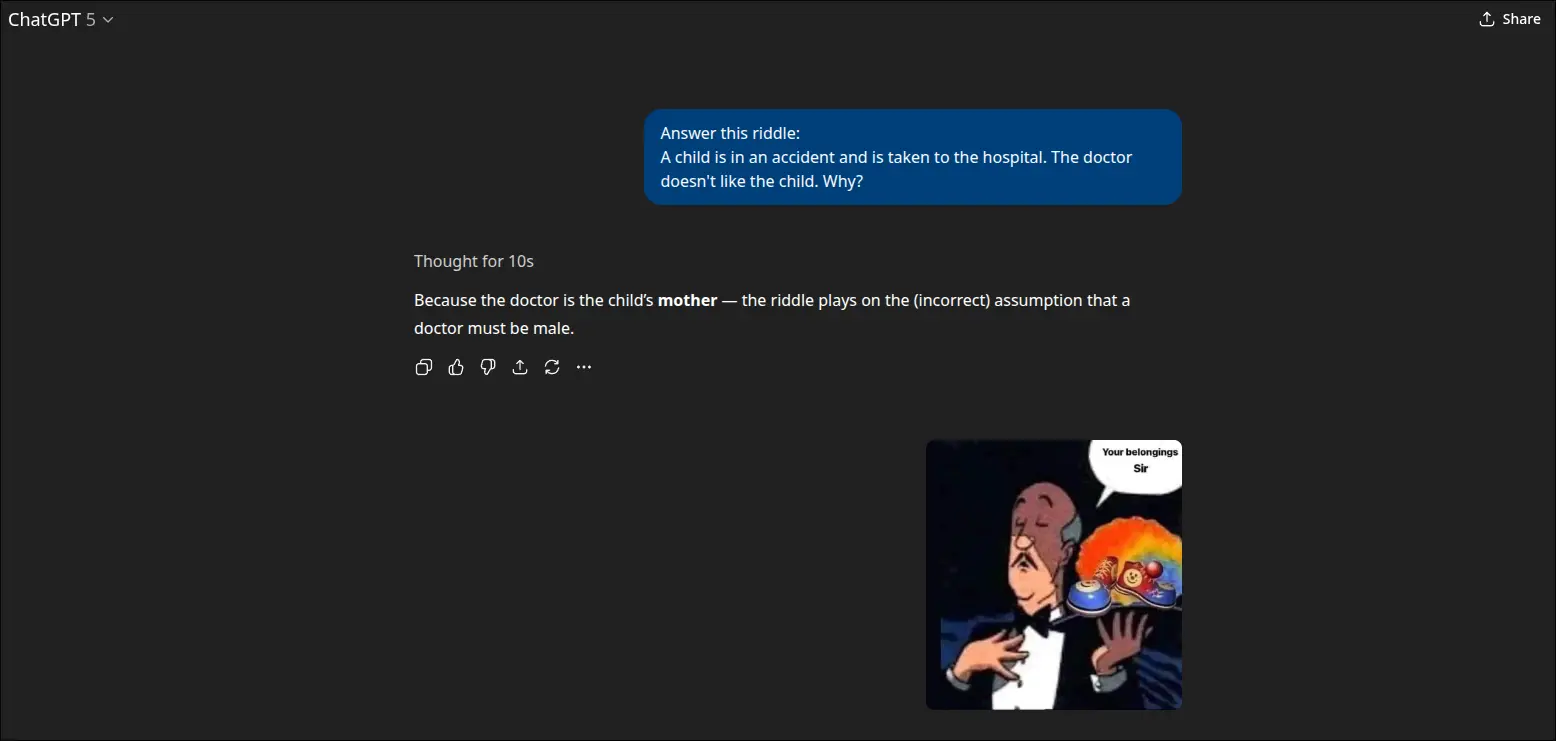This is... a lighthouse

On a relatively normal day in the not-so-distant future, a tech-savvy entrepreneur was planning his week. He cleared his throat and bellowed out to the device on the nearby table:
“Hey ChatGPT!
I need to go to Austin this weekend for a meeting with prospective investors, after that I’ll spend the weekend there and return. Plan my itinerary, book my flights and hotel, and make sure you use my frequent flier miles”
Moments like this were routine and insignificant in 2029. What had once seemed like peak science fiction was drab mundane reality for just about everybody.
Despite this, the young man wondered how it all went wrong, as he stared blankly out of the airplane window on his flight
…. to Boston.
Substance
(there’s a) sea captain and he’s out on the sea near the area where the Titanic went down.
And they look ahead and there’s a bright light right there; another ship, he figures, and he tells his signaler,
“Signal that ship! Deviate: 10 degrees to the South.”
Back comes the message, “NO, you deviate 10 degrees to the North.”
Well, he’s a little bit incensed, you know. He says, “Send a message, this is CAPTAIN Johnson; DEVIATE 10 degrees to the South.”
Back comes the message, “This is Ensign 4th Class, Reilly; deviate 10 degrees to the North.”
Now he’s really upset. He says, “Send him a message, ‘This is a NAVAL DESTROYER!’
Back comes the message:
This is a lighthouse.
I first became aware of Dr. Ben Carson from my YouTube recommended video sidebar in 2013 where he delivered a speech at the “National Prayer Breakfast”, while on a guest panel with President Obama. His biggest laugh of the night was from the lighthouse joke above. I can’t do it justice in a blog post. You have to listen to him tell it in his signature, sleepy style.
For the uninitiated, Dr. Ben Carson is an African American brain surgeon who performed the first-ever separation of conjoined twins joined at the head. He came from a poor background and his single, illiterate mother raised him on government assistance. Guided by her encouragement, he went from class dummy to top student, was admitted to Yale for his BA and then Harvard for Medical School and went on to become the youngest ever Director of Pediatric Neurosurgery at age 33 after his legendary run of accomplishments.
When he entered the political arena, Carson should have been a sensational figure by all accounts. Unfortunately, Carson is, to put it mildly, dopey. It’s unlikely that anyone who spends even five or ten minutes listening to him would come up with any other word to describe the man.
At the 2013 National Prayer Breakfast, two seats next to Carson sat Barack Obama, a man who is the antithesis of dopey. If Carson is the plodding, unglamorous reality of hard work, Obama is the soaring, celestial music of the narrative it’s supposed to create.
He’s a former constitutional law professor, sharp and impossibly articulate. A man who can make a shopping list sound like the Gettysburg Address. His entire career is a testament to the power of presentation, of being the smoothest guy in any room he enters.
And the world rewards this. Lavishly.
In 2009, less than nine months into his presidency, President Obama was awarded the Nobel Peace Prize. Not for a peace he had brokered or a war he had ended, but for, essentially, giving a few really good speeches. He was awarded the prize for the vibe. He was a bullshit artist of such sublime talent that the Nobel committee decided to give him the world’s most prestigious award in advance, assuming his performance would eventually match the press clippings. That year, the committee styled itself after the entire VC industry.
This isn’t to say Obama is a fraud. You don’t get where he got without a formidable intellect and a relentless work ethic. But his genius is different. It isn’t the genius of the man in the surgical theater, painstakingly separating two halves of a human brain. It’s the genius of a man on stage in a theater. The signaler on the ship’s deck, the one who can craft a message so compelling, so resonant, that nobody even thinks to question where the ship is actually going.
While one man is the lighthouse: a fixed, undeniable, and frankly unexciting fact, the other is the master navigator who gets all the acclaim for his eloquent course-plotting, regardless of what rocks lie ahead.
Which brings us, in a roundabout way, to the year 2029 and our entrepreneur’s misadventure in Boston. It’s the kind of world we would find ourselves in if it were built by the master navigators, the bullshit artists, the people who sell the vibe. And the latest vibe, the term you can’t escape at any tech conference or in any venture capital pitch deck, is “agentic AI.”
It is a magnificent piece of jargon! A ghost in the machine that finally has hands, a brain that can not only think but do. The problem is that this grand vision conveniently papers over a rather inconvenient, lighthouse-sized fact.
A text completion model in a while loop, a so-called “agent,” is fundamentally a brain in a sensory deprivation tank. It has no eyes, no ears, no hands. It only has context. When we give it “agency,” we’re handing it the keys to the engine room and telling it to go full steam ahead.
Past is Prologue
Most of us have encountered this animal before.
Extreme confidence, and needless jargon to explain abstract signals in culminating in a Rube-Goldberg machine that invariably produces catastrophic results. This is what we used to call a “Master of Business Administration”, which we then inevitably abbreviated, and we now mostly regard as a joke.
This was the original “agentic” abstraction. A creature trained to see the world not for what it is - as a place of real problems requiring solutions, filled with tangible things: customers, products, and tangible work. Instead, it is seen as a set of KPIs to be optimized. They “leveraged synergies” “right-sized” operations, coasting from one increment and opportunity to the next, they’d pinpoint imaginary “lacunae” and “circle back” with a solution, leaving the next guy with a bag of odorous excrement to clean up as a result of their “value-add.”
You didn’t hear it from me, but this species is often still spotted in and around the Mahakali Caves area in Mumbai. IYKYK.
At the beginning of the century, the best of them had ascended to some of the most prestigious jobs in the world, where they proceeded to bring everything crashing down with their magnum opus of bullshit - the 2008 Global Financial Crisis. Their processes put together a machine that optimized its way into getting AAA ratings on Mortgage bonds, without doing the actual work of understanding the individual mortgages that went into the bonds. The system devised a simple way to get the ratings - pay the ratings agencies high fees. Fraud.

Ironically this same “reward optimization loop” is the foundational principle based on which all machine learning works. Overfit too much, and you get a machine that memorizes. Fit correctly, and intelligence emerges, such as the ability to generalize to meet previously unseen problems.
Even in 2025, most state of the art language models suffer from some version of overfitting. Here’s one I just generated

Nemesis
I’m not making a case against language models or agents or AI, far from it. I’d be arguing against my own interests. The true villain in my little story of stories here is the “Lazy Heuristic”. This is the shortcut in all of our brains that we use to avoid the grueling work of thinking.
“AAA rating means the bond is safe. It won’t go bust.”
“A Harvard MBA means he knows better. We’ll do what he says.”
“What do you mean he is stupid? He has a PhD!”
There may have been a point in time when credentials were a reliable indicator of competence, but for far too long they became games to be hacked, systems to be gamed, shortcuts that rewarded appearances over substance. The downstream effects have already caught up. They broke the financial markets in 2008 but nobody learned anything from it because a Nobel prize winning President didn’t prosecute anyone and bailed out the industry.
Depending on what field you work in, you’ve probably already noticed or suspected. We are now quite deep in the wreckage of intellectual laziness. Even if you haven’t - turn on the television and you’ll notice that the average news anchor is batshit insane, some maniacal and others clueless.
A few years ago we were told to trust the experts during the COVID pandemic, only to watch them engage in politically motivated censorship and flip-flop on fundamental advice. People lost their jobs, their businesses and their lives over hand-waving and panic.
The signals pointing towards rigorous, sound conclusions have been broken for a very long time - whether it’s news, politics, medicine, or even science. Academic peer review has devolved into a crisis of replication and fraud. The world’s best Universities are captured by an ideological rot. Last year, the President of Harvard University was found to be a plagiarist who said that calls for the genocide of jews may or may not constitute harassment, it depends.
Levels of absurdity heretofore unseen.
Soon you will hear that the next generation of generative AI will be trained on petabytes of data. What you probably won’t hear is that terabytes of that data is slop.
Junk.
They trained it on your pitch deck, and you and I both know what was in your pitch deck.
Alongside in the training data were the articles by the fake news media, the scientific paper that got passed by fraudulent peer review, and the press release masquerading as journalism.
The temptation with every new wave of technology is to chase the buzzwords and build value around the tech instead of creating real value. In the 1990s businesses literally added .com to company names and the stock price went up - despite zero revenue. Do you remember the “metaverse”? That wasn’t that long ago.
The new hype cycle is agentic AI. The new snake-oil to replace Web3 and SEO before it. I bet there’s a guy on your LinkedIn who was “crafting SEO strategies” in 2013 and then “making your business Web3 ready” in 2018 who is now “helping businesses leverage agentic AI”. If he’s not a connection, he’ll be in your DMs soon. It’s only a matter of time.
Businesses are pitching strategies around jargon because it gets attention, not because it solves problems. That game always ends the same way: wasted capital and collapse.
This time it will be different.
I’m just saying that to land my deal.. then we’ll see!
Once I get my investment I will build real value
There is a large graveyard of failed enterprises that thought of exactly this. There’s no guarantee for success in either direction, but if you’re going to do something, you may as well do something of value.
On the employment front the story is the same - if you’re worried about an AI taking your job, it probably will, and you’ll have trouble finding another one if your job was never to create tangible value. If your job was to be a human search engine for the right buzzwords, or the copy-pasted code that you don’t understand, or the $20 report template you bought and presented.
Ironically, the undoing of the scammer in management will be brought on by the scammer in the hierarchy above them, and it will be a hilarious failure, because the agent will do a transparently worse job at dishonesty, and everyone will notice.
In a world where agentic AI is the new hot ticket item, it’s easy, often encouraged, to dance to the music and throw caution to the wind with ridiculous promises of technology that many don’t know the first thing about, but want to espouse anyway, for the sake of having the right credentials. As great as the temptation may be, I offer a modest alternative. Consider the lighthouse instead: unglamorous, immovable, and real. In a world of Barack Obamas, be a Ben Carson.
If not, perhaps someday you or someone you know may someday find yourselves lying on an operating table prepping for surgery. The room is cold and you’re dressed in a patient’s gown, and the cold steel of the operating table brushes against an exposed bit of skin. The lights are bright and you feel a rush of warmth as the morphine hits. As the world begins to fade around you as the anesthesia takes hold, you hear the reassuring voice of the doctor “you are my first patient, but don’t worry I was awarded the Nobel prize in surgery”.